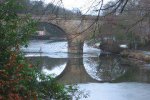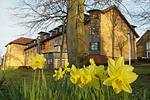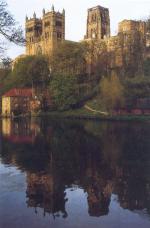
The LMS-EPSRC Durham Research Symposia began in 1974, and form an established series of international research meetings, with over 100 symposia to date. They provide an excellent opportunity to explore an area of research in depth, to learn of new developments, and to instigate links between different branches. The format is designed to allow substantial time for interaction and research. The meetings are held in July and August, usually lasting for 10 days, with up to 70 participants, roughly half of whom will come from the UK. Lectures and seminars take place in the Department of Mathematical Sciences, Durham University.

Please see the programme.

Stochastic analysis is the branch of probability theory that deals with the behaviour of stochastic dynamical systems. It emerged as a core area of mathematics in the late 20th century, and important developments have continued in the 21st century. The array of applications of stochastic analysis is vast and encompasses weather prediction, the risk management of pension funds to the modelling of earthquakes.
The symposium will focus on four themes of research and will bring together senior and emerging researchers from the UK and overseas to increase and consolidate awareness of fields within the UK community.
The four themes for this symposium will be:
A. Stochastic partial differential equations (SPDEs)
The study of stochastic differential equations (SDEs) is rooted in the origins of the subject in the 1940s; the investigation of SPDEs is more recent. Applications areas are diverse, e.g. fluid dynamics (stochastic Navier-Stokes equation), superconductivity (the stochastic Ginzburg-Landau equation), nonlinear filtering (the Zakai equation), interest rate modelling (the Heath-Jarrow-Morton-Musiela equation) and the growth of surfaces (the Kardar-Parisi-Zhang equation). Specific themes highlighted in the meeting will be:
- Hairer’s theory of Regularity Structures which enables us to make rigorous sense of certain nonlinear and singular SPDEs that arise throughout Physics.
- SPDEs that are driven by more sophisticated noises than the usual Brownian motion/space-time white noise, e.g. noise with jump discontinuities and self-similarity properties.
B. Rough paths
This is a new approach to stochastic ordinary and partial differential equations developed by Lyons in the 1990s. There are connection with theme A and the parallel development of paracontrolled distribution theory of Gubinelli, Imkeller and Perkowski. The study of the signature and the expected signatures is a rough path spin-off, and is now spurring significant developments in applications, e.g. in the software for Chinese handwriting recognition developed by Graham.
C. Numerics, algorithms and statistics
Numerical analysis for SDEs and SPDEs has been an enormous growth area over the last twenty years and are essential in many applied areas, e.g. data assimilation for weather prediction. Important topics include:- Numerical schemes inspired by classical methodology including finite elements, finite difference methods, splitting methods and stochastic Galerkin approximations.
- Monte Carlo based methods, including Markov Chain Monte Carlo, Sequential Monte Carlo and Multi-level Monte Carlo
- Qualitative analysis of these methods including rates of convergence, large deviations and error estimates based on central limit theorem results.
- Multiscale and asymptotic problems. (market callibration) require probabilistic numerical methods.
D. Mean field games
These are mathematical models used for studying large crowds of agents that rationally interact with one another. Applications of mean field games range from industrial economics to algorithmics on graphs and networks, non-linear statistics and modelling of commodities price dynamics. The theory of mean field games has received in the last decade since the seminal work of Lasry and Lions. Lions provided a major impetus to this area through his seminal 2007-2008 series of lectures at the Collège de France.
Note: The scientific programme will provisionally start on the morning of July 10th and finish in the afternoon of July 20th.

Useful information about travelling to Durham can be found on the Department of Mathematical Sciences and Durham University webpages.

Accommodation for participants will be in Grey College. Guest rooms offer en-suite and internet facilities. Attendance is by invitation only and fees for self-supporting participants are payable by cash, credit card, sterling cheques or sterling travellers cheques at registration.

